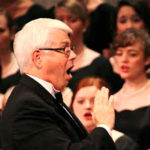No one ever promised vocational ministry would be easy, said Michael Godfrey, executive director of True Course Ministries . That’s why he knew his mentoring program for clergy would meet an immediate need.
Godfrey’s 32 years experience in Christian ministry revealed to him a huge disconnect between seminary education and the practical demands of full-time ministry.
Bumps and bruises
“I’ve had my own bumps and bruises along the way, in terms of just dysfunctional situations, relational situations … issues with self-awareness, perceptions of others,” Godfrey said.
After leaving one particularly difficult situation, Godfrey realized his struggles weren’t unique.
“I came to the realization that people and systems can turn, and you can get caught in the middle of it. It just opened my eyes and I saw there was a whole lot of that,” he said.
In 2001, Godfrey began pursuing a doctor of ministry degree at Baylor University’s Truett Theological Seminary. While enrolled at Truett, Godfrey found the direction he had been seeking during a visit to the Baptist General Convention of Texas minister/church relations office.
“When I was working on my D.Min., I went to Jan Daehnert’s office and asked him: ‘Where’s the hole? Where’s the need?’ He said we have plenty of after-care (for forced termination), but we don’t have any preventive care. That’s the hole,” Godfrey said.
Support and education
Godfrey developed True Course Ministries as he felt God directing him to find a way to offer support and continued education to ministers.
“About 90 percent of ministers feel inadequately trained,” he said.
The program, now completing its fifth year, earned the Malcolm S. Knowles Award for Excellence in Adult Education from the American Association of Adult and Continuing Education in 2007.
Sign up for our weekly edition and get all our headlines in your inbox on Thursdays
“It’s a ministry God put on me to equip people,” Godfrey said.
Several months of informal survey showed Godfrey ministers were seeking mentors to help deal with feelings of isolation, loneliness, and burnout. Godfrey also wanted his program to address church struggles and prevent forced terminations.
True Course Ministries focuses on issues of administration, leadership, social and emotional understanding and communication.
“I really knew God wanted this,” Godfrey said. “Within the first six months, I just started talking to people … and the thing we kept hearing again and again, almost without hesitation, was, ‘This is a need.’”
Mentoring
One-on-one, personal mentorship with individually customized goals distinguishes True Course Ministries. Concerned church members sometimes refer ministers to True Course, but church staff members also seek out the program themselves—often simply to develop skills and further education. At the first meeting, mentors work with ministers to write a mutual covenant of responsibility.
They continue to meet monthly to discuss issues, growth and future goals. Official collaboration can last up to two years, but many participants keep a close friendship with mentors long after the sessions’ completion.True Course Ministries mentors are seasoned ministers themselves, well-experienced in the ups and downs of full-time ministry.
According to the description on the ministry’s website, truecourseministries.com, they are “highly trained in adult education and experienced in leadership of volunteer organizations.”
Mentors also must remain active in church leadership. Some serve as interim pastors. Others focus on conflict management, and counseling ministers and their families following forced termination. Pastor Taylor Sandlin at Southland Baptist Church in San Angelo recalled a positive experience with True Course. Sandlin contacted Godfrey, whom he met during seminary, after he entered full-time ministry. Sandlin wanted to continue his education after seminary, and the True Course program appealed to his desire for accountability and educated feedback, he said.
“Ministry can often be a lonely endeavor,” Sandlin wrote in a testimonial about True Course. The program helped connect him to other ministers and to transition from the close-knit community of seminary to full-time congregational ministry, he said. “Michael and (his wife) Susan have become for my family more than mentors; they have become our friends—kindred spirits in this life of faith,” Sandlin wrote.
In his sessions with Godfrey, Sandlin said they focused on creating and maintaining long-term vision, a skill that has shaped his decisions ever since.
“Developing goals … is probably the thing that I’ve carried with me,” Sandlin said. “What do I want my ministry to look like? What do I want to look like, in spiritual or family life, in five years, and how do I get there? By developing those goals, and focusing on those goals, it’s allowed me to say ‘no’ to a lot of good things that nevertheless would have taken away from those long-term goals of family time and nurturing a healthy church.”














We seek to connect God’s story and God’s people around the world. To learn more about God’s story, click here.
Send comments and feedback to Eric Black, our editor. For comments to be published, please specify “letter to the editor.” Maximum length for publication is 300 words.